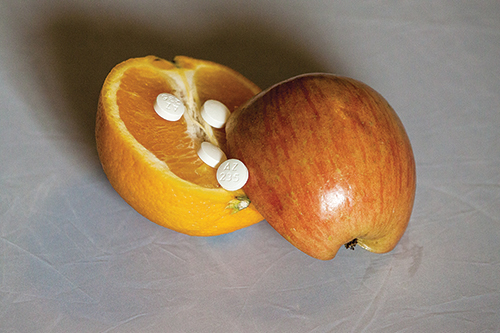
Despite a love for Oreos, burritos and carrot cake, nutrition is something I take pretty seriously. I love to go grocery shopping and ogle the various in-season produce. However enjoyable a jaunt through the produce aisle can be, though, much of the food that we see in stores and regularly consume has been genetically modified.
My first foray into alternative eating styles occurred in the sixth grade with my first attempt at vegetarianism. I didn’t take the diet seriously until I got older and started researching the food industry and where what we eat comes from. After moving to Portland I switched to a strictly vegan diet, and in the past month I’ve been working on eliminating as much gluten and processed food as possible. The idea of eating something that’s been genetically modified holds very little appeal to me, and I’m not the only one who feels that way.
The problem with genetically modified organisms? The practice hasn’t been around long enough for us to know its long-term effects. There’s “proof” on both the anti- and pro-GMO sides, but it’s still too early to come to a solid conclusion.
While many of us were busy changing our Facebook profile pictures to the red marriage equality sign, President Obama quietly signed into law the Monsanto Protection Act. Which, by the way, was cowritten by the Monsanto Corporation, one of a small handful of billion-dollar companies that own the majority of American crops, and the engineer of GMOs.
The Monsanto Act does some pretty shifty things involving the protection of large food companies. It’s great that we have a president who values some truly wonderful things, but we should be giving his administration the stink-eye on this one.
Oregon hasn’t given up, though. The state just tossed its hat into the GMO ring, a maneuver that The Oregonian thinks is jumping the gun. France completely banned the growing of crops based on genetically modified food, but then again, as The Oregonian asserted, that might just be because they’re paranoid.
Currently, there are bills up for consideration that would affect the state’s use and sale of GMOs. Oregon House Bill 2532 would require any food item that was genetically modified in any way to be sold with a warning of sorts on the packaging.
For some reason, there’s resistance to this. People have a right to know what they’re eating, and allowing them to find out while at the grocery store could very well save a life—without long-term research, who knows what the consequences of eating GMO foods are?
Granted, foods labeled as containing GMOs most likely won’t be purchased, which could drive up the price of non-GMO food. Even with this tiny little negative variable, the solution seems pretty clear: Stop growing GMOs in the first place.
The counterargument is that there won’t be enough food to feed the population.
This is ridiculous. A huge majority of the world’s crops are grown just to feed the livestock that’s slaughtered for meat consumption in the U.S.
Not to toot my vegan horn, but a plant-based diet is far more ethical in terms of fellow sentient beings’ livelihoods as well as the impact on the earth.
If we cut back (or cut out) meat consumption, the need for those huge, GMO-riddled crops immediately goes away. Farmers would be able to concentrate on cultivating sustainable, custom and organic farms rather than perpetuate the idea that it’s OK to feed future generations genetically altered soybeans.
Despite all the positivity around the anti-GMO movement, The Oregonian still stuck with the “we’re moving too fast” idea. The editorial staff said that grocers like Whole Foods already make it a point to label what is or isn’t GMO-free. That’s great and all, but not everyone has the means or privilege to shop at places like Whole Foods, Traders Joe’s or New Seasons.
Changing labels might be more government interference than a lot of people are comfortable with, but I like knowing what’s in my food, especially since I, like many others, can’t always afford to shop at the more select grocery stores.
Whether we should even continue to grow GMOs might come up during the 2014 legislative session, and that’s what we should be concentrating on, according to The Oregonian.
There’s merit to that. However, labeling GMOs first will help raise awareness of how prominent they are in our food. Until GMO labeling happens, be conscious of what you’re eating. When you can afford it, shop at smaller, locally sourced grocery stores. Sure, those glossy red apples are much brighter and larger, but they’re also riddled with dyes and god knows what else.
If we stop buying as many GMOs as possible, food producers will notice and things will happen. Also, pay attention to local legislature. These small, state-based bills are things we have a say in, so why not make it so GMOs must be labeled? It’s a start to a very long fight, but one that will have a positive outcome in the end.

